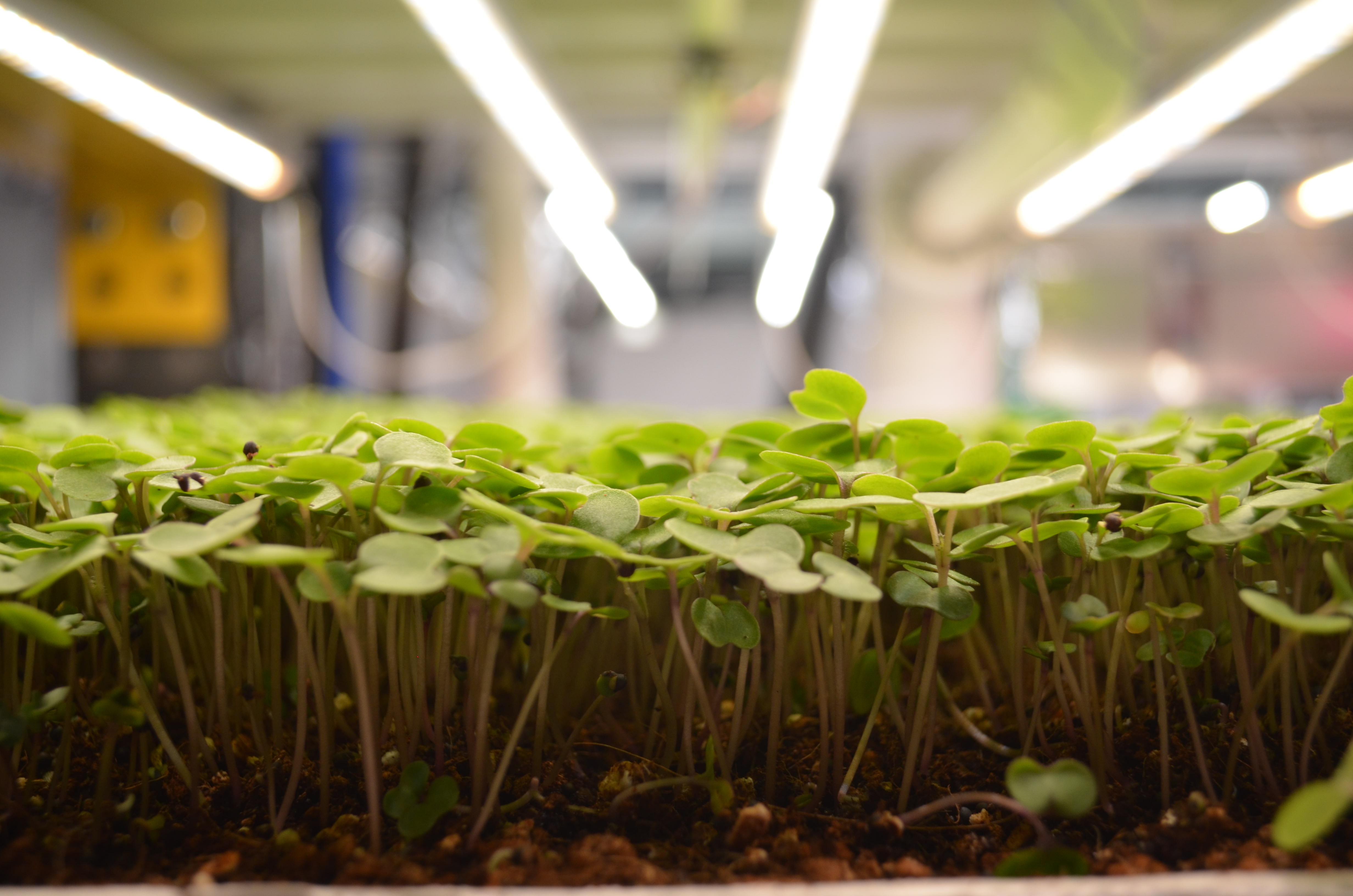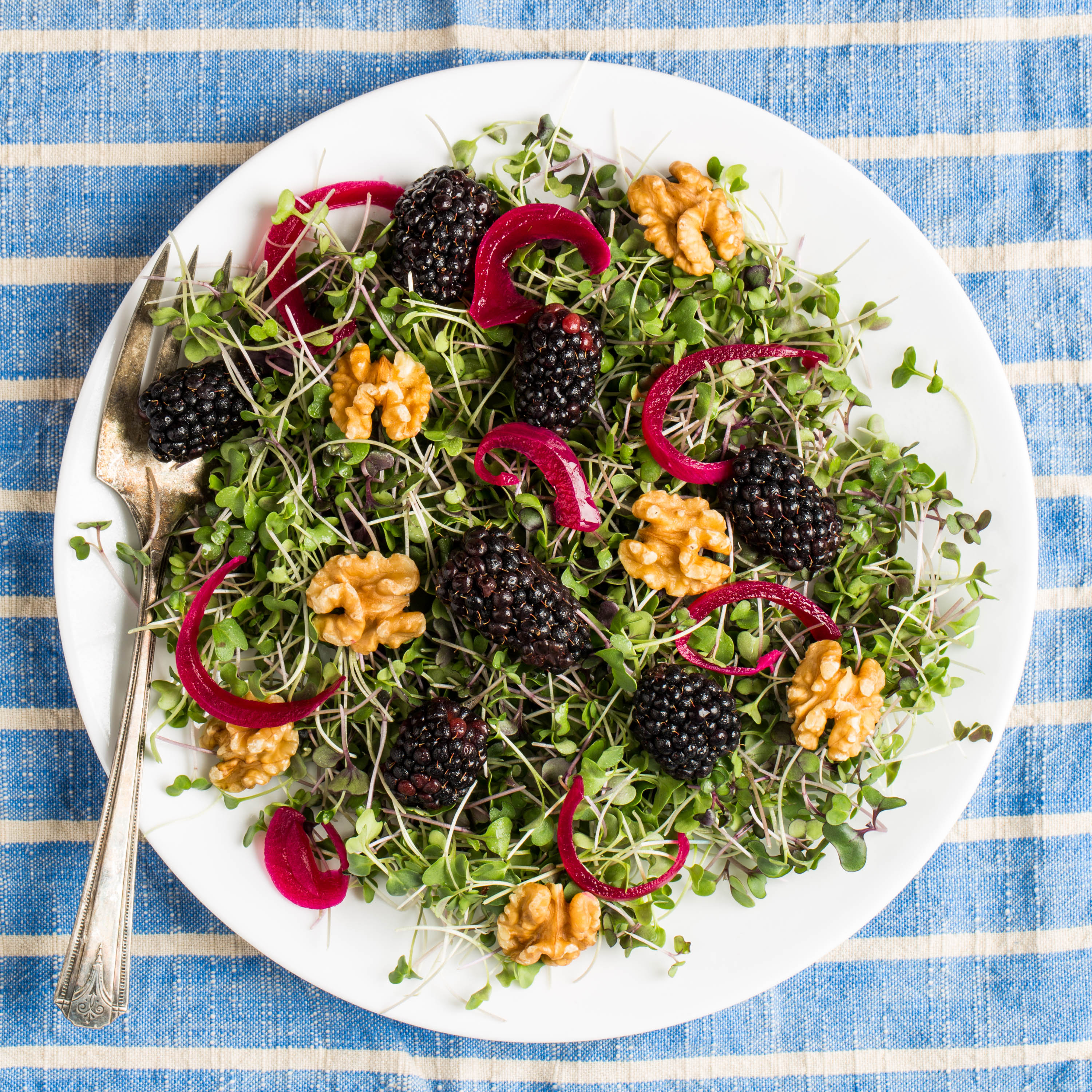If you live in an urban area, you likely struggle to source fresh produce locally. The issue is not solely a lack of farms, but often a lack of farm space. Brooklyn-based Upward Farms solves this issue by simply growing upward. They utilize an oft-forgotten space — the sky — as a means of growing food.
In the Upward Farms indoor farm, you’ll see stacks of microgreens, a nutrient-dense crop, growing atop fish tanks — a style of gardening called vertical aquaponics. Rather than using monocultural methods of in-ground, soil-based gardening, Upward Farms was founded on the principle of embracing ecology. They’re also able to avoid the use of toxic pesticides and herbicides by planting in a way that ensures a healthy harvest naturally. Their motto: Celebrate Ecology, Share Abundance.
It’s a great ethos to say out loud. But to live by that idea, you have to put in the work, think outside the norm, and have a deep desire to change deeply rooted ideas, entrenched practices, and nay-sayers. Lucky for… the world, really, those challenges don’t give Jason Green and the crew at Upward Farms a moment’s pause.

Upward Farms was founded by CEO Jason Green in 2013 as a call to action — to move away from farming methods that are harmful to the planet. But Green wasn’t alone in his efforts. He founded the company along with construction manager and systems engineer Matt LaRosa and chief technology officer Ben Silverman, with the initial goal of raising tilapia and growing vegetable greens. Their simple, streamlined approach, which focused on growing vegetables before trying to sell their fish is, what sets them apart from other aquaponic farms that didn’t last. It’s a tricky market. And until someone has successfully piloted it, it can be difficult to get investor buy-in.
“We think aquaponics provides a better model for us, the consumer, and the planet,” Green tells us. “Our yields are more than double the average for vertical farming, and we do that while reducing fertilizer levels by 90 percent.”
Aquaponics work in harmony with nature. Essentially it is a system in which the waste produced by farmed fish (Upward Farms uses striped bass and salmon) supply the necessary nutrients for plants to grow hydroponically, which in turn purifies the water.
“There’s this symbiotic relationship where the bacteria are living around the plant roots,” Green explains. “They’re taking the nutrients, they’re absorbing part of that, and they’re delivering the rest to the plant. All of that symbiosis is what enables our plant health.”

While Upward farms have given the art of aquaponics a modern spin, the practice itself is ancient. It was practiced both in Chinese and Aztec cultures for millennia. In fact, Indigenous Mexican communities still use chinampas (aquatic gardens) to this day. This is a testament to the efficacy of the method. Upward Farms has no intention of reinventing the wheel, just redirecting it.
For Green, the key to a successful farm is rooted in biodiversity.
‘The key with biodiversity is building food webs,” Green says. “To date, we’ve grown four species of fish, more than 80 varieties of leafy greens, and everything from tomatoes to turnips.” Green points out that “biodiversity isn’t simply how many different kinds of greens I can grow” but about how many layers you can build to create food.
We’re not just growing fish and plants,” he says. “We’re also growing the microbiome.”
Upward Farms provides their community with microgreens, baby greens, and fish. Whole Foods was their initial retailer, selling packaged, personal-sized microgreen boxes. They recently scaled up their operation in 2020 by opening a new headquarters that expanded their production capacity by over 20 percent. But Green doesn’t think Upward Farms is the only aquaponics farm with the capacity to expand.
“In the U.S., we’re poised for massive growth in aquaculture,” he says. “The U.S. is the third-largest consumer of seafood in the world after China and Japan, and we currently import 90 percent of the seafood we eat.” Meaning that a “game-changer” is certainly called for.
“Our mission is to replace today’s globalized food supply with products that are local, organic and low cost,” he says.
That’s an innovation we should all be excited to see on the plate.








